University Assignment: Global Business in the Asian Century Report
VerifiedAdded on 2023/01/05
|5
|1018
|39
Report
AI Summary
This report delves into the complexities of global business within the context of the Asian century. It begins by summarizing and explaining the arguments against strategic trade policy, highlighting the challenges governments face in implementing effective trade strategies and the potential for unintended consequences. The report then traces the evolution of the world trading system, emphasizing the increasing economic integration and the need for international rules, while also addressing current trade issues such as the impact of emerging nations and concerns related to human rights and sustainability. Finally, it explores the implications of these developments for managers, discussing how they must adapt to economic, political, and legal changes, evaluate market opportunities, and navigate ethical considerations to succeed in the global market. The report also touches on the significance of first-mover advantages and the challenges posed by trade barriers and cultural differences.
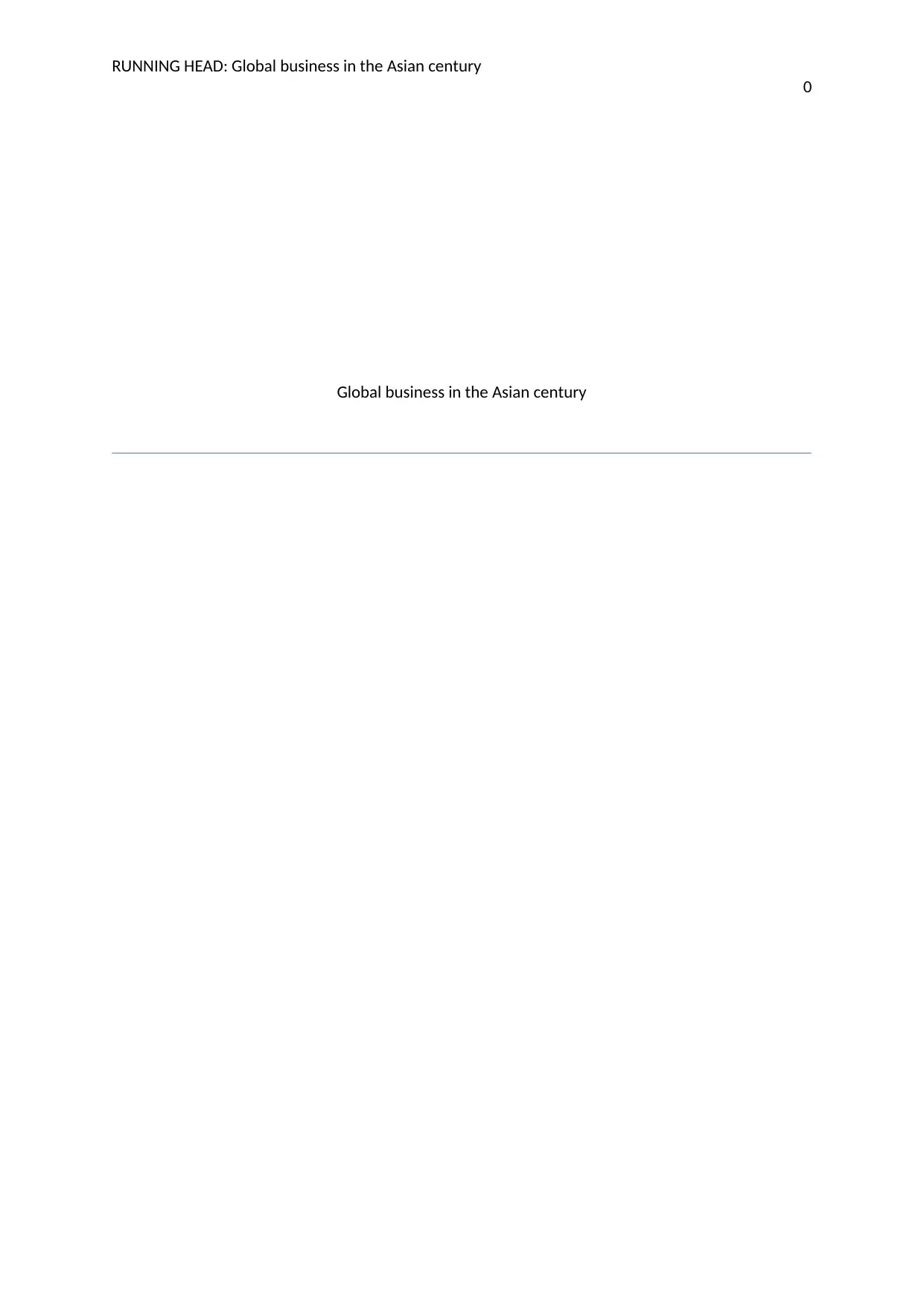
RUNNING HEAD: Global business in the Asian century
0
Global business in the Asian century
0
Global business in the Asian century
Paraphrase This Document
Need a fresh take? Get an instant paraphrase of this document with our AI Paraphraser
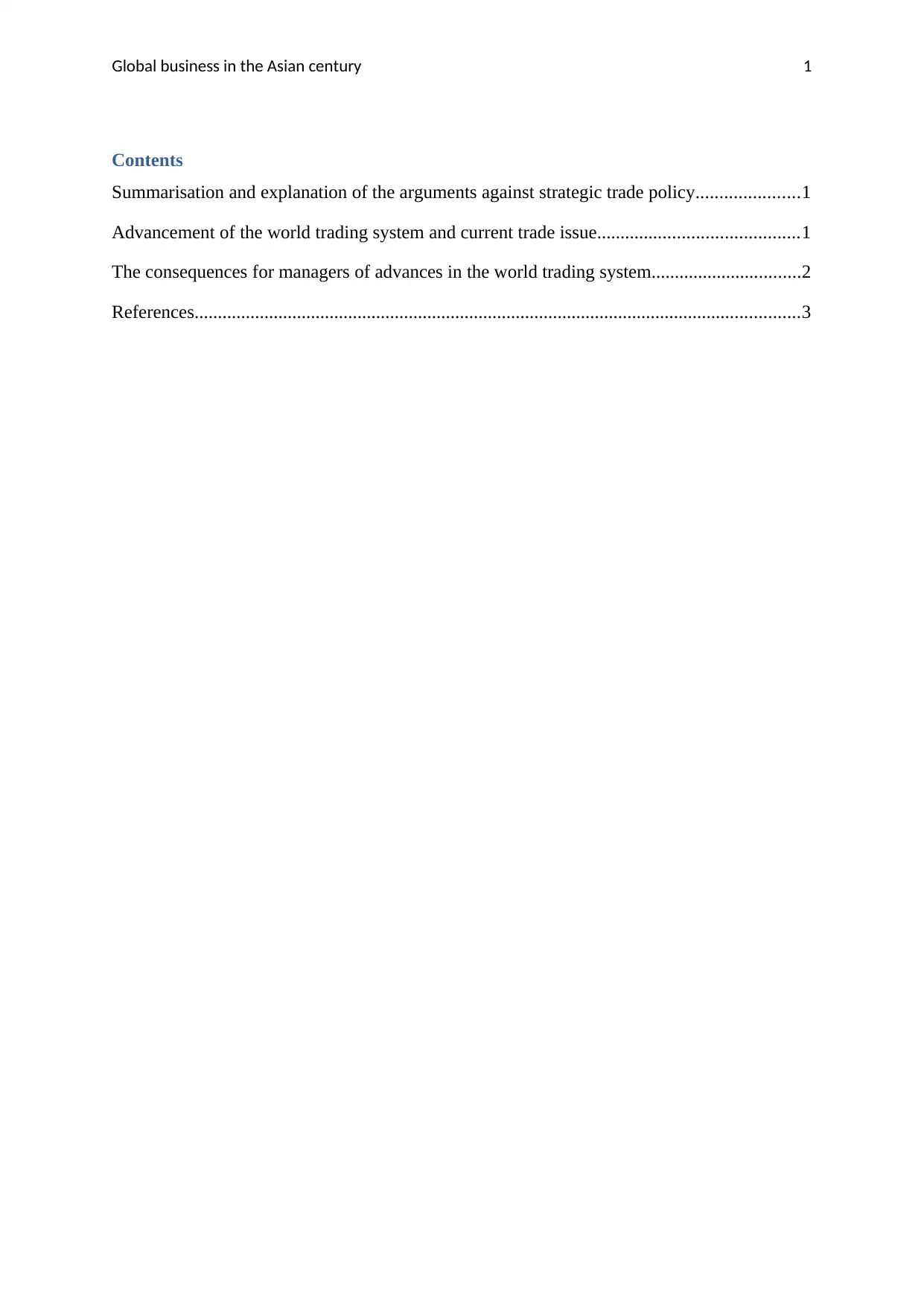
Global business in the Asian century 1
Contents
Summarisation and explanation of the arguments against strategic trade policy......................1
Advancement of the world trading system and current trade issue...........................................1
The consequences for managers of advances in the world trading system................................2
References..................................................................................................................................3
Contents
Summarisation and explanation of the arguments against strategic trade policy......................1
Advancement of the world trading system and current trade issue...........................................1
The consequences for managers of advances in the world trading system................................2
References..................................................................................................................................3
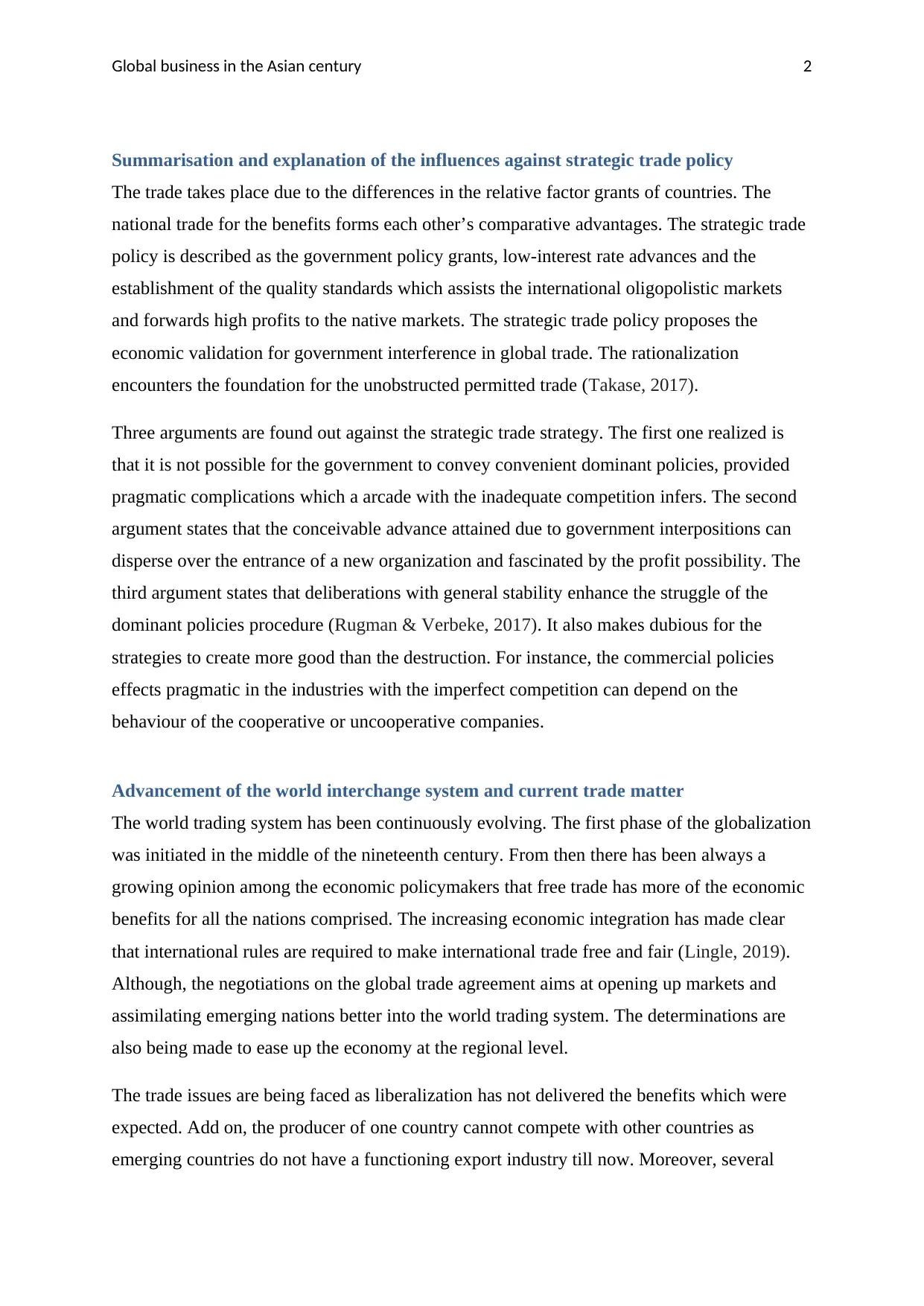
Global business in the Asian century 2
Summarisation and explanation of the influences against strategic trade policy
The trade takes place due to the differences in the relative factor grants of countries. The
national trade for the benefits forms each other’s comparative advantages. The strategic trade
policy is described as the government policy grants, low-interest rate advances and the
establishment of the quality standards which assists the international oligopolistic markets
and forwards high profits to the native markets. The strategic trade policy proposes the
economic validation for government interference in global trade. The rationalization
encounters the foundation for the unobstructed permitted trade (Takase, 2017).
Three arguments are found out against the strategic trade strategy. The first one realized is
that it is not possible for the government to convey convenient dominant policies, provided
pragmatic complications which a arcade with the inadequate competition infers. The second
argument states that the conceivable advance attained due to government interpositions can
disperse over the entrance of a new organization and fascinated by the profit possibility. The
third argument states that deliberations with general stability enhance the struggle of the
dominant policies procedure (Rugman & Verbeke, 2017). It also makes dubious for the
strategies to create more good than the destruction. For instance, the commercial policies
effects pragmatic in the industries with the imperfect competition can depend on the
behaviour of the cooperative or uncooperative companies.
Advancement of the world interchange system and current trade matter
The world trading system has been continuously evolving. The first phase of the globalization
was initiated in the middle of the nineteenth century. From then there has been always a
growing opinion among the economic policymakers that free trade has more of the economic
benefits for all the nations comprised. The increasing economic integration has made clear
that international rules are required to make international trade free and fair (Lingle, 2019).
Although, the negotiations on the global trade agreement aims at opening up markets and
assimilating emerging nations better into the world trading system. The determinations are
also being made to ease up the economy at the regional level.
The trade issues are being faced as liberalization has not delivered the benefits which were
expected. Add on, the producer of one country cannot compete with other countries as
emerging countries do not have a functioning export industry till now. Moreover, several
Summarisation and explanation of the influences against strategic trade policy
The trade takes place due to the differences in the relative factor grants of countries. The
national trade for the benefits forms each other’s comparative advantages. The strategic trade
policy is described as the government policy grants, low-interest rate advances and the
establishment of the quality standards which assists the international oligopolistic markets
and forwards high profits to the native markets. The strategic trade policy proposes the
economic validation for government interference in global trade. The rationalization
encounters the foundation for the unobstructed permitted trade (Takase, 2017).
Three arguments are found out against the strategic trade strategy. The first one realized is
that it is not possible for the government to convey convenient dominant policies, provided
pragmatic complications which a arcade with the inadequate competition infers. The second
argument states that the conceivable advance attained due to government interpositions can
disperse over the entrance of a new organization and fascinated by the profit possibility. The
third argument states that deliberations with general stability enhance the struggle of the
dominant policies procedure (Rugman & Verbeke, 2017). It also makes dubious for the
strategies to create more good than the destruction. For instance, the commercial policies
effects pragmatic in the industries with the imperfect competition can depend on the
behaviour of the cooperative or uncooperative companies.
Advancement of the world interchange system and current trade matter
The world trading system has been continuously evolving. The first phase of the globalization
was initiated in the middle of the nineteenth century. From then there has been always a
growing opinion among the economic policymakers that free trade has more of the economic
benefits for all the nations comprised. The increasing economic integration has made clear
that international rules are required to make international trade free and fair (Lingle, 2019).
Although, the negotiations on the global trade agreement aims at opening up markets and
assimilating emerging nations better into the world trading system. The determinations are
also being made to ease up the economy at the regional level.
The trade issues are being faced as liberalization has not delivered the benefits which were
expected. Add on, the producer of one country cannot compete with other countries as
emerging countries do not have a functioning export industry till now. Moreover, several
⊘ This is a preview!⊘
Do you want full access?
Subscribe today to unlock all pages.

Trusted by 1+ million students worldwide
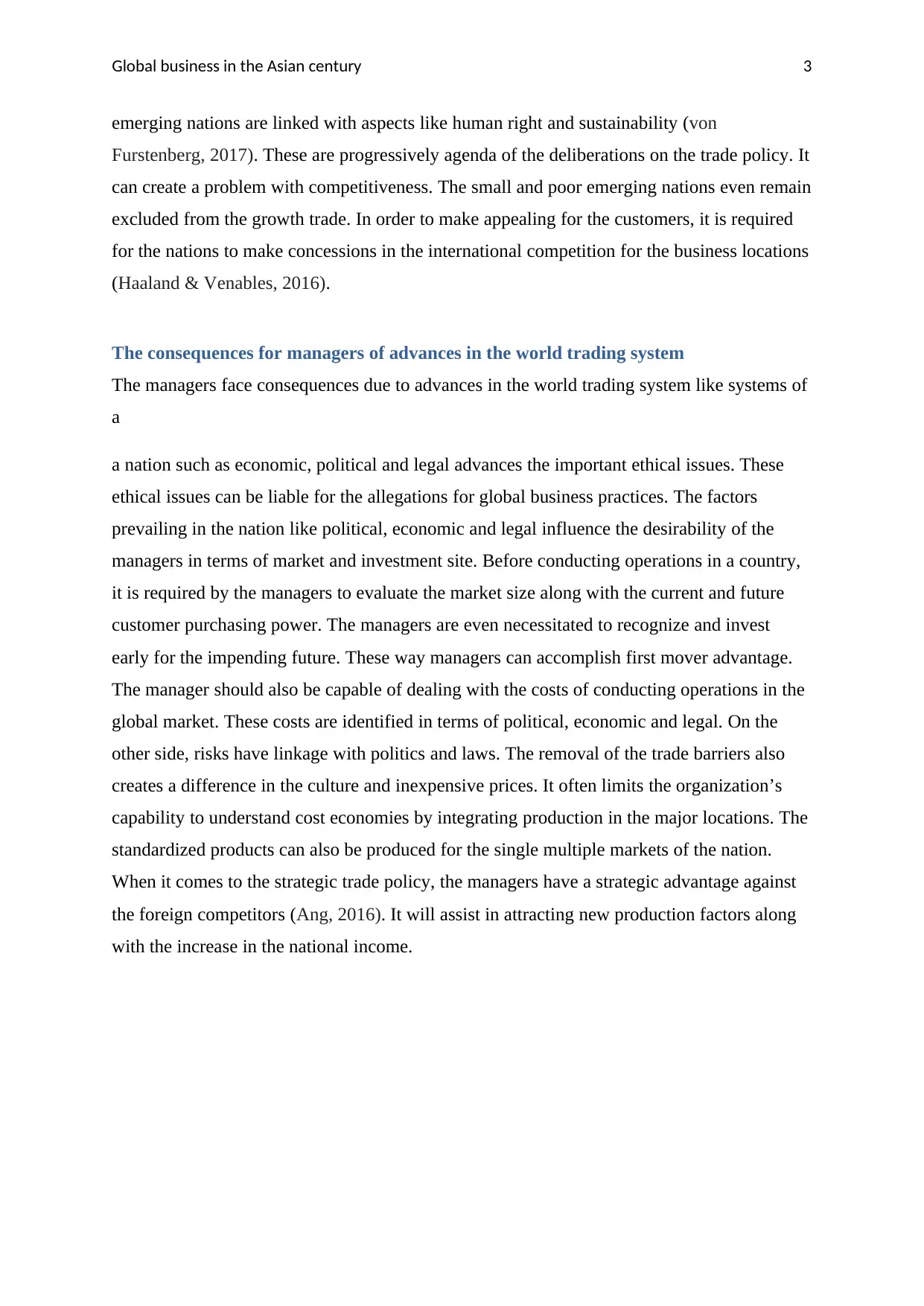
Global business in the Asian century 3
emerging nations are linked with aspects like human right and sustainability (von
Furstenberg, 2017). These are progressively agenda of the deliberations on the trade policy. It
can create a problem with competitiveness. The small and poor emerging nations even remain
excluded from the growth trade. In order to make appealing for the customers, it is required
for the nations to make concessions in the international competition for the business locations
(Haaland & Venables, 2016).
The consequences for managers of advances in the world trading system
The managers face consequences due to advances in the world trading system like systems of
a
a nation such as economic, political and legal advances the important ethical issues. These
ethical issues can be liable for the allegations for global business practices. The factors
prevailing in the nation like political, economic and legal influence the desirability of the
managers in terms of market and investment site. Before conducting operations in a country,
it is required by the managers to evaluate the market size along with the current and future
customer purchasing power. The managers are even necessitated to recognize and invest
early for the impending future. These way managers can accomplish first mover advantage.
The manager should also be capable of dealing with the costs of conducting operations in the
global market. These costs are identified in terms of political, economic and legal. On the
other side, risks have linkage with politics and laws. The removal of the trade barriers also
creates a difference in the culture and inexpensive prices. It often limits the organization’s
capability to understand cost economies by integrating production in the major locations. The
standardized products can also be produced for the single multiple markets of the nation.
When it comes to the strategic trade policy, the managers have a strategic advantage against
the foreign competitors (Ang, 2016). It will assist in attracting new production factors along
with the increase in the national income.
emerging nations are linked with aspects like human right and sustainability (von
Furstenberg, 2017). These are progressively agenda of the deliberations on the trade policy. It
can create a problem with competitiveness. The small and poor emerging nations even remain
excluded from the growth trade. In order to make appealing for the customers, it is required
for the nations to make concessions in the international competition for the business locations
(Haaland & Venables, 2016).
The consequences for managers of advances in the world trading system
The managers face consequences due to advances in the world trading system like systems of
a
a nation such as economic, political and legal advances the important ethical issues. These
ethical issues can be liable for the allegations for global business practices. The factors
prevailing in the nation like political, economic and legal influence the desirability of the
managers in terms of market and investment site. Before conducting operations in a country,
it is required by the managers to evaluate the market size along with the current and future
customer purchasing power. The managers are even necessitated to recognize and invest
early for the impending future. These way managers can accomplish first mover advantage.
The manager should also be capable of dealing with the costs of conducting operations in the
global market. These costs are identified in terms of political, economic and legal. On the
other side, risks have linkage with politics and laws. The removal of the trade barriers also
creates a difference in the culture and inexpensive prices. It often limits the organization’s
capability to understand cost economies by integrating production in the major locations. The
standardized products can also be produced for the single multiple markets of the nation.
When it comes to the strategic trade policy, the managers have a strategic advantage against
the foreign competitors (Ang, 2016). It will assist in attracting new production factors along
with the increase in the national income.
Paraphrase This Document
Need a fresh take? Get an instant paraphrase of this document with our AI Paraphraser
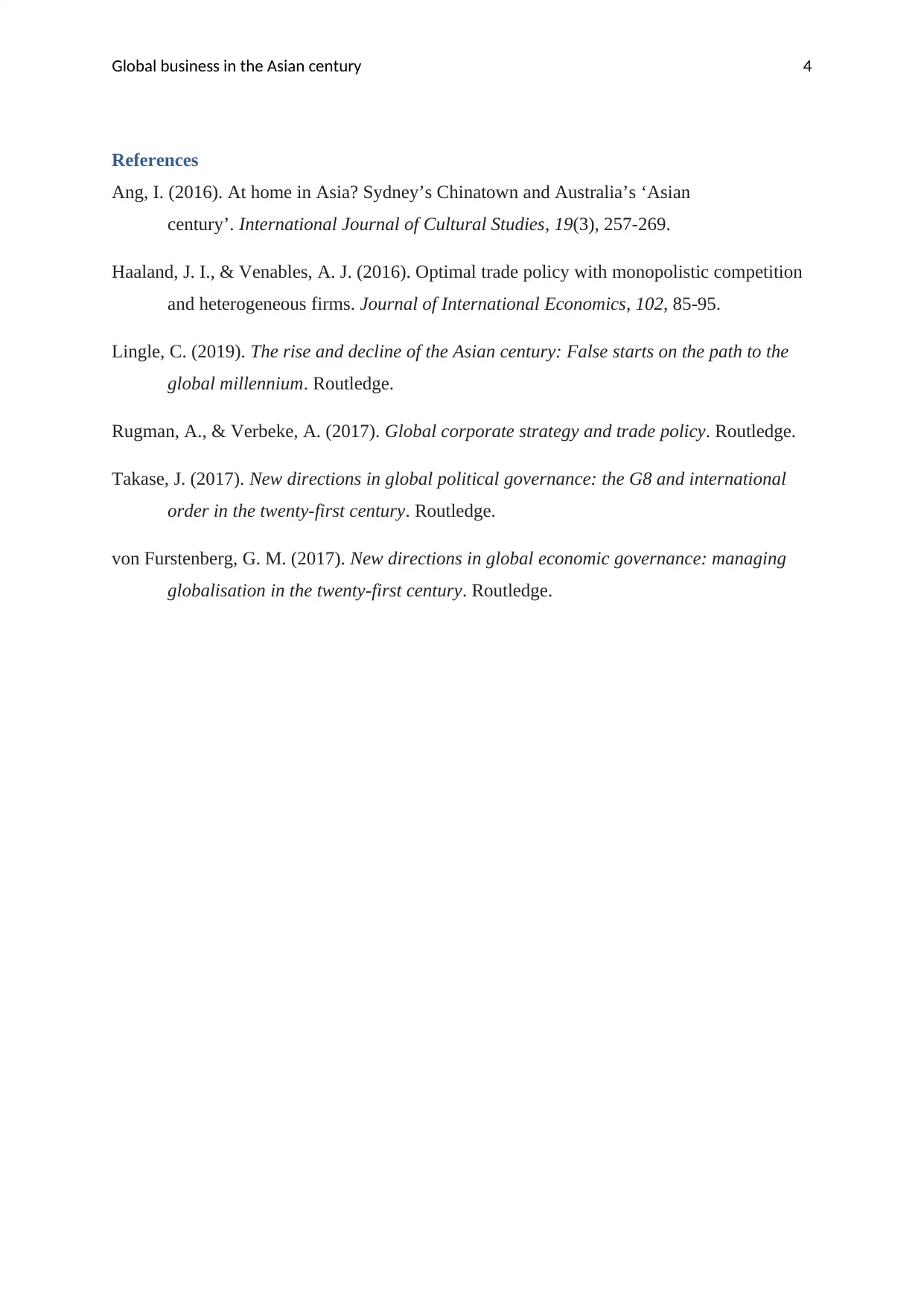
Global business in the Asian century 4
References
Ang, I. (2016). At home in Asia? Sydney’s Chinatown and Australia’s ‘Asian
century’. International Journal of Cultural Studies, 19(3), 257-269.
Haaland, J. I., & Venables, A. J. (2016). Optimal trade policy with monopolistic competition
and heterogeneous firms. Journal of International Economics, 102, 85-95.
Lingle, C. (2019). The rise and decline of the Asian century: False starts on the path to the
global millennium. Routledge.
Rugman, A., & Verbeke, A. (2017). Global corporate strategy and trade policy. Routledge.
Takase, J. (2017). New directions in global political governance: the G8 and international
order in the twenty-first century. Routledge.
von Furstenberg, G. M. (2017). New directions in global economic governance: managing
globalisation in the twenty-first century. Routledge.
References
Ang, I. (2016). At home in Asia? Sydney’s Chinatown and Australia’s ‘Asian
century’. International Journal of Cultural Studies, 19(3), 257-269.
Haaland, J. I., & Venables, A. J. (2016). Optimal trade policy with monopolistic competition
and heterogeneous firms. Journal of International Economics, 102, 85-95.
Lingle, C. (2019). The rise and decline of the Asian century: False starts on the path to the
global millennium. Routledge.
Rugman, A., & Verbeke, A. (2017). Global corporate strategy and trade policy. Routledge.
Takase, J. (2017). New directions in global political governance: the G8 and international
order in the twenty-first century. Routledge.
von Furstenberg, G. M. (2017). New directions in global economic governance: managing
globalisation in the twenty-first century. Routledge.
1 out of 5
Related Documents
Your All-in-One AI-Powered Toolkit for Academic Success.
+13062052269
info@desklib.com
Available 24*7 on WhatsApp / Email
![[object Object]](/_next/static/media/star-bottom.7253800d.svg)
Unlock your academic potential
Copyright © 2020–2026 A2Z Services. All Rights Reserved. Developed and managed by ZUCOL.





